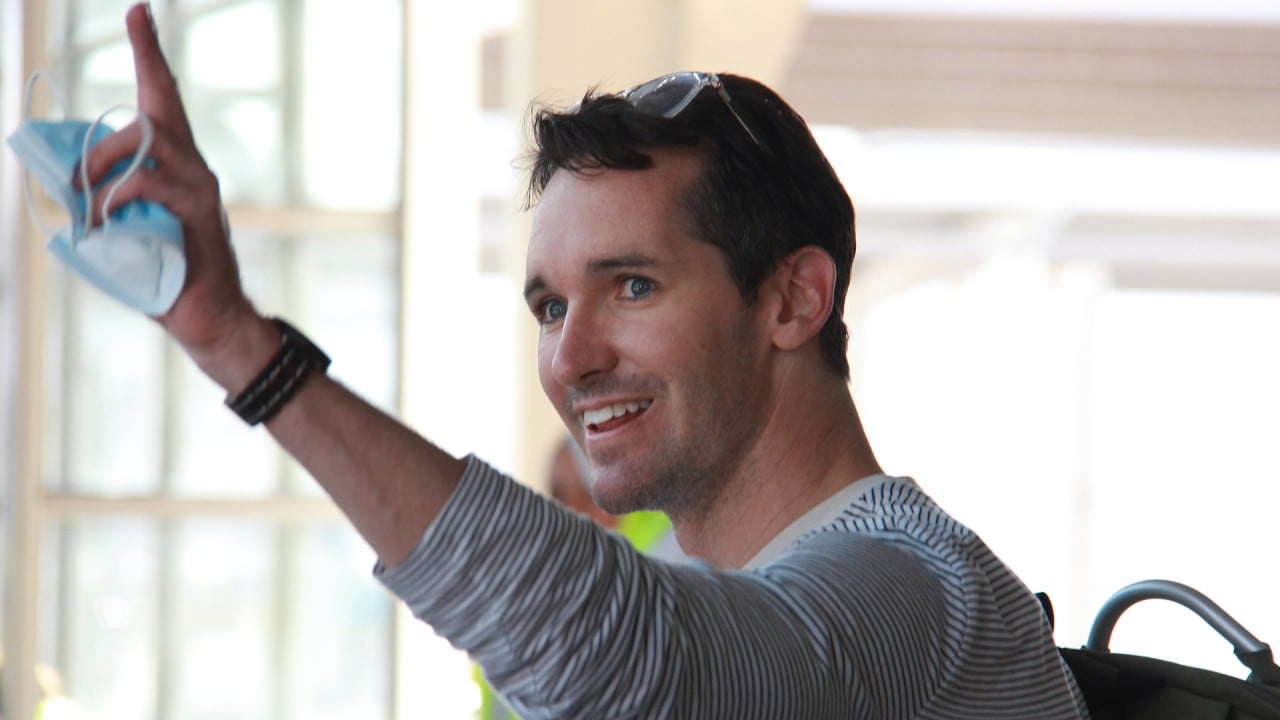
03:39
Australia’s last two accredited journalists in mainland China evacuated as diplomatic ties worsen

Two Australian academics have been banned from entering China, after Australia revoked the visas of two Chinese scholars on national security grounds, Chinese state media has reported.
Clive Hamilton, an Australian professor and author of books on Chinese influence operations in other countries, and Alex Joske, an expert on Communist Party influence who works as an analyst at the Australian Strategic Policy Institute, were targeted under the country’s exit and entry law, according to state-run tabloid Global Times, which is affiliated to party mouthpiece People’s Daily.
The report, which quoted anonymous sources, did not cite any reasons for the decision.
Chinese foreign ministry spokesman Wang Wenbin said on Thursday that China had the sovereign right to decide which foreigners to allow into the country.
“China welcomes foreigners to come to China to learn, work and live, objectively introducing China’s situation and domestic policies and enhancing understanding between China and the world,” he said. “At the same time, China firmly rejects anyone who uses the cover of academia to spread false information to smear and attack China and harm China’s national security.”
Australia’s Department of Foreign Affairs and Trade said every country was “entitled to determine its own visa requirements”.
“Australia strongly supports academic freedom and freedom of speech,” a spokesman for the department said.
Hamilton, a professor of public ethics at Charles Sturt University in Canberra, said he was surprised to learn of the ban from Chinese state media, and that he had decided two or three years ago that it was too dangerous to travel to China.
“This ban is quite unexpected, although I have been on Beijing’s enemy list for some years,” he said. “Each time Australia takes an action to protect itself from Beijing’s influence or interference, Beijing feels the need to retaliate. The Australian government is not engaged in any ‘tit-for-tat’ game. That’s all down to the thin-skinned men who run China’s government.”
Hamilton, who recently co-authored Hidden Hand: Exposing How the Chinese Communist Party is Reshaping the World with German scholar Mareike Ohlberg, said relations between the two countries would only improve when Beijing stopped interfering in Australia and trying to bully Canberra.
“The Australian government has a number of times said clearly and calmly that it will not risk national security or give up Australia’s sovereignty,” he said. “How long will it take for Beijing to hear that message?”
Joske, who grew up in Beijing, said on Twitter that the reported ban was the latest attempt by the Communist Party to “punish those who shine a light on its activities”. He said the Chinese government had never challenged the accuracy of his work on the party’s efforts to influence politics and transfer technology from around the world, which he would continue to research.
“While I grew up in China and would love to return in better times, I decided years ago that the Chinese government’s actions have made the personal risk from travelling to China too high,” he said. “I have not held or applied for a Chinese visa in years.”
Last month Australia cancelled visas for Chen Hong and Li Jianjun, who run the Australian Studies Centres at East China Normal University and Beijing Foreign Studies University, respectively.

03:39
Australia’s last two accredited journalists in mainland China evacuated as diplomatic ties worsen
Tensions have been escalating between Beijing and Canberra, with accusations from both sides that their journalists have been poorly treated. Earlier this month, two Australian correspondents were evacuated from China over concerns they could be detained.
Their return to Australia occurred a week after it was confirmed that Australian journalist Cheng Lei had been detained on national security grounds in China. It was also revealed by Beijing that four Chinese journalists working in Australia had been subjected to searches of their homes.
Relations between the two countries have soured during the coronavirus pandemic – in particular since Australia’s call for an independent inquiry into the origin of the outbreak in China. Beijing has suspended Australian beef and barley exports, in apparent retaliation, while Canberra has made accusations about Chinese influence and interference.